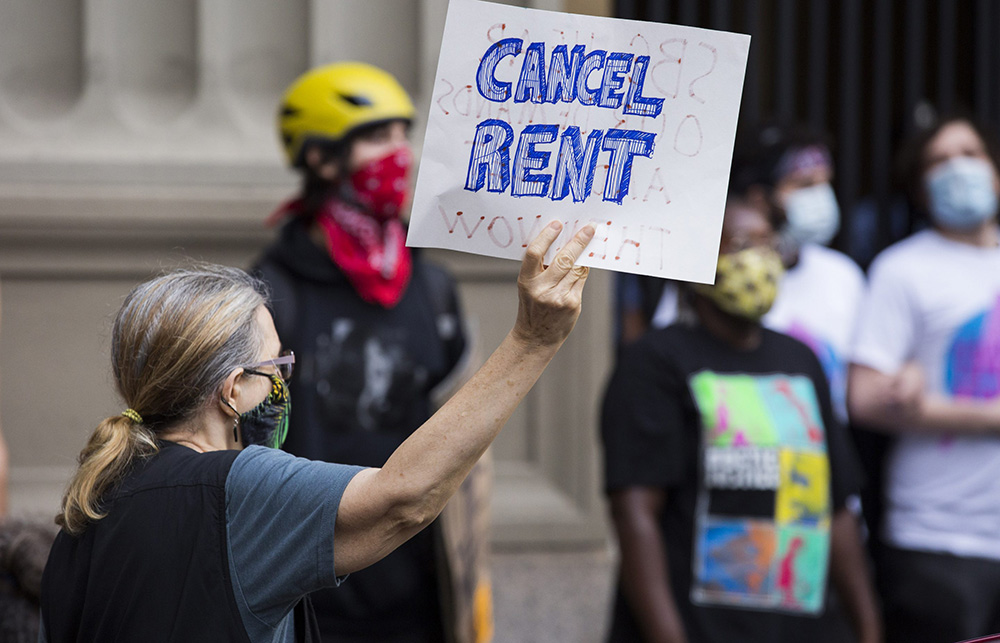
美國一項(xiàng)新簽署的暫緩驅(qū)逐行政令從9月4日星期五開始生效,,進(jìn)一步保護(hù)千百萬因?yàn)樾鹿谝咔槎?jīng)濟(jì)受困的租客免遭驅(qū)逐??紤]到居無定所的人群容易感染或傳播新冠病毒,,此行政令由特朗普政府簽署,并通過美國疾病控制與預(yù)防中心發(fā)布,。
這項(xiàng)暫緩令將持續(xù)到今年12月31日,,為租客提供法律保護(hù)。不過,,該法令對保護(hù)對象列出一定要求,,其中一部分要求可能具有主觀色彩。以下是大家需要了解的內(nèi)容,。
誰能符合資格,?
租客必須滿足這五項(xiàng)規(guī)定才符合資格:
1. 租客已經(jīng)盡“最大努力”,首先嘗試去獲取政府在租金或住房方面提供的所有援助,。一些州和城市可能已經(jīng)開展援助項(xiàng)目,,州和地方市政當(dāng)局也可能已經(jīng)做出暫緩決定,提供了相同或更高水平的保護(hù)方案,。在這種情況下,,聯(lián)邦法規(guī)將讓步于地方法規(guī)。
2. 租客的個人預(yù)期年收入不得超過9.9萬美元,,若已經(jīng)結(jié)婚或者夫妻雙方在2020年聯(lián)合納稅申報,,則年收入不得超過19.8萬美元。租客若沒有在2019年被要求提交納稅申報單,,或者在今年早些時候收到過《冠狀病毒援助,、救濟(jì)和經(jīng)濟(jì)安全法案》(CARES Act)發(fā)放的紓困支票,,則也符合新令資格,。
3. 租客因?yàn)槭杖搿颁J減”、被解雇或不得不支付“巨額”醫(yī)療費(fèi)用,,而無法支付全額租金,。
4. 除了其他不可自由支配的開支,租客正在盡“最大努力”繼續(xù)支付盡可能接近全額的租金,。
5. 租客“可能”因?yàn)楸或?qū)逐而無家可歸或被迫合住,,從而得病或?qū)⒉《緜鞑ソo他人,。
這些要求可能具有主觀性,因此在租客與房東發(fā)生分歧的情況下,,管轄住房訴訟的法院法官可能不得不介入,,并最終判定租客是否受到這五項(xiàng)規(guī)定的“保護(hù)”。
該行政令規(guī)定,,租客必須簽署一份聲明并將其提交給房東,,聲明中概述了這五項(xiàng)資格。疾病控制與預(yù)防中心表示,,這樣一來房東就不能合法驅(qū)逐租客,,否則聯(lián)邦政府將對房東予以刑事處罰。
房東有何影響,?
房東若違反該行政令,,但并未因此造成租客死亡,則將被處以不超過10萬美元的罰款或一年監(jiān)禁,,或兩者兼施,。房東若因?yàn)轵?qū)逐租客而致其身亡,則可能面臨25萬美元的罰款或一年監(jiān)禁,,或兩者兼施,。如有組織違令驅(qū)逐租客,可能收到20萬美元的罰款,,若致對方身亡將被罰款50萬美元,。
假設(shè)房東遵守這一行政令,他們?nèi)匀豢梢园凑盏谒臈l規(guī)定讓租客盡最大努力支付部分租金,,從而收取該部分資金,。該行政令亦不禁止房東收取費(fèi)用或利息,如果租約中有相關(guān)條款的話,。
只要租客仍然在盡其所能支付部分房租,,房東就無法在12月31日之前因?yàn)榻?jīng)濟(jì)原因?qū)⑵潋?qū)逐。不過,,房東仍然可以因?yàn)槠渌R娫蚨?qū)客,,比如發(fā)現(xiàn)其破壞財產(chǎn)或從事犯罪行為。房東可能會利用這一理由在年底前驅(qū)逐租客,,因此租客應(yīng)該保持警惕,,遵守租約。
該行政令預(yù)計(jì)將面臨法律挑戰(zhàn),。房東協(xié)會已經(jīng)在多個州提起訴訟,,要求中止此前頒布的新冠疫情相關(guān)暫緩令,并聲稱這些指令違憲,。如果這種情況再次發(fā)生,,法院將做出最終裁定,。
租金何時歸還?
目前尚不清楚,,但很可能在12月31日行政令到期之后,,在此期間未付的租金就需要償還。這項(xiàng)暫緩令并沒有給出具體指示,,但此觀點(diǎn)來自全國低收入住房聯(lián)盟(National Low Income Housing Coalition),,這是一家位于華盛頓的宣傳組織。
該組織發(fā)表聲明稱:“雖然暫緩驅(qū)逐勢在必行,,但這只是權(quán)宜之計(jì),,指令失效之后,欠下的租金還是會把租客推向經(jīng)濟(jì)深淵?,F(xiàn)在的做法只是推遲了驅(qū)逐行動,,并不能完全阻止。國會和白宮必須重新談判,,然后通過一項(xiàng)新冠疫情紓困法案,,提供至少1000億美元的緊急租賃援助?!?/p>
美國眾議院民主黨提起的《健康與經(jīng)濟(jì)復(fù)蘇綜合緊急解決方案法案》(HEROES Act)也提到了1000億美元這個數(shù)字,,這是繼《冠狀病毒援助、救濟(jì)和經(jīng)濟(jì)安全法案》之后的另一項(xiàng)法案,,但國會尚未就此達(dá)成一致,。(財富中文網(wǎng)0
譯者:秦維奇
美國一項(xiàng)新簽署的暫緩驅(qū)逐行政令從9月4日星期五開始生效,進(jìn)一步保護(hù)千百萬因?yàn)樾鹿谝咔槎?jīng)濟(jì)受困的租客免遭驅(qū)逐,??紤]到居無定所的人群容易感染或傳播新冠病毒,此行政令由特朗普政府簽署,,并通過美國疾病控制與預(yù)防中心發(fā)布,。
這項(xiàng)暫緩令將持續(xù)到今年12月31日,為租客提供法律保護(hù),。不過,,該法令對保護(hù)對象列出一定要求,其中一部分要求可能具有主觀色彩,。以下是大家需要了解的內(nèi)容,。
誰能符合資格?
租客必須滿足這五項(xiàng)規(guī)定才符合資格:
1. 租客已經(jīng)盡“最大努力”,,首先嘗試去獲取政府在租金或住房方面提供的所有援助,。一些州和城市可能已經(jīng)開展援助項(xiàng)目,州和地方市政當(dāng)局也可能已經(jīng)做出暫緩決定,,提供了相同或更高水平的保護(hù)方案,。在這種情況下,聯(lián)邦法規(guī)將讓步于地方法規(guī),。
2. 租客的個人預(yù)期年收入不得超過9.9萬美元,,若已經(jīng)結(jié)婚或者夫妻雙方在2020年聯(lián)合納稅申報,則年收入不得超過19.8萬美元,。租客若沒有在2019年被要求提交納稅申報單,,或者在今年早些時候收到過《冠狀病毒援助、救濟(jì)和經(jīng)濟(jì)安全法案》(CARES Act)發(fā)放的紓困支票,,則也符合新令資格,。
3. 租客因?yàn)槭杖搿颁J減”、被解雇或不得不支付“巨額”醫(yī)療費(fèi)用,,而無法支付全額租金,。
4. 除了其他不可自由支配的開支,租客正在盡“最大努力”繼續(xù)支付盡可能接近全額的租金,。
5. 租客“可能”因?yàn)楸或?qū)逐而無家可歸或被迫合住,,從而得病或?qū)⒉《緜鞑ソo他人。
這些要求可能具有主觀性,,因此在租客與房東發(fā)生分歧的情況下,,管轄住房訴訟的法院法官可能不得不介入,并最終判定租客是否受到這五項(xiàng)規(guī)定的“保護(hù)”,。
該行政令規(guī)定,,租客必須簽署一份聲明并將其提交給房東,聲明中概述了這五項(xiàng)資格,。疾病控制與預(yù)防中心表示,,這樣一來房東就不能合法驅(qū)逐租客,否則聯(lián)邦政府將對房東予以刑事處罰,。
房東有何影響?
房東若違反該行政令,,但并未因此造成租客死亡,,則將被處以不超過10萬美元的罰款或一年監(jiān)禁,或兩者兼施,。房東若因?yàn)轵?qū)逐租客而致其身亡,,則可能面臨25萬美元的罰款或一年監(jiān)禁,或兩者兼施,。如有組織違令驅(qū)逐租客,,可能收到20萬美元的罰款,若致對方身亡將被罰款50萬美元,。
假設(shè)房東遵守這一行政令,,他們?nèi)匀豢梢园凑盏谒臈l規(guī)定讓租客盡最大努力支付部分租金,,從而收取該部分資金。該行政令亦不禁止房東收取費(fèi)用或利息,,如果租約中有相關(guān)條款的話,。
只要租客仍然在盡其所能支付部分房租,房東就無法在12月31日之前因?yàn)榻?jīng)濟(jì)原因?qū)⑵潋?qū)逐,。不過,,房東仍然可以因?yàn)槠渌R娫蚨?qū)客,比如發(fā)現(xiàn)其破壞財產(chǎn)或從事犯罪行為,。房東可能會利用這一理由在年底前驅(qū)逐租客,,因此租客應(yīng)該保持警惕,遵守租約,。
該行政令預(yù)計(jì)將面臨法律挑戰(zhàn),。房東協(xié)會已經(jīng)在多個州提起訴訟,要求中止此前頒布的新冠疫情相關(guān)暫緩令,,并聲稱這些指令違憲,。如果這種情況再次發(fā)生,法院將做出最終裁定,。
租金何時歸還,?
目前尚不清楚,但很可能在12月31日行政令到期之后,,在此期間未付的租金就需要償還,。這項(xiàng)暫緩令并沒有給出具體指示,但此觀點(diǎn)來自全國低收入住房聯(lián)盟(National Low Income Housing Coalition),,這是一家位于華盛頓的宣傳組織,。
該組織發(fā)表聲明稱:“雖然暫緩驅(qū)逐勢在必行,但這只是權(quán)宜之計(jì),,指令失效之后,,欠下的租金還是會把租客推向經(jīng)濟(jì)深淵。現(xiàn)在的做法只是推遲了驅(qū)逐行動,,并不能完全阻止,。國會和白宮必須重新談判,然后通過一項(xiàng)新冠疫情紓困法案,,提供至少1000億美元的緊急租賃援助,。”
美國眾議院民主黨提起的《健康與經(jīng)濟(jì)復(fù)蘇綜合緊急解決方案法案》(HEROES Act)也提到了1000億美元這個數(shù)字,,這是繼《冠狀病毒援助,、救濟(jì)和經(jīng)濟(jì)安全法案》之后的另一項(xiàng)法案,但國會尚未就此達(dá)成一致。(財富中文網(wǎng)0
譯者:秦維奇
Starting Friday, Sept. 4, a new, expanded eviction moratorium will go into effect with the aim of preventing millions of renters from being evicted due to the financial impact of the coronavirus pandemic. Ordered by the Trump Administration, the mandate was issued through the Centers for Disease Control and Prevention, since those without housing stability are high risks to contract or spread the COVID-19 virus.
The moratorium is set to run through Dec. 31 of this year, offering legal protections for renters. But there are certain requirements that must be met to qualify, some of which could be subjective. Here's what you need to know.
Who is eligible?
A renter must meet five stipulations to be eligible:
1.They have used their "best efforts" to first obtain all available government assistance for rent or housing. Some states and cities might have assistance programs already in place. State and local municipalities might also already have a moratorium in place providing the same or better level protection, in which case the local rules would apply over the federal one.
2.They expect to make no more than $99,000 in income as an individual or $198,000 if married or filing a joint tax return in the 2020 calendar year. They can also qualify if they were not required to file a tax return in 2019 or received a stimulus check as part of the CARES Act earlier this year.
3.They are unable to pay the full amount of rent due to experiencing a "substantial" loss of income, or because they were laid off or had to pay "extraordinary" medical expenses.
4.They are using their "best efforts" to continue making at least partial rent payments as close to the full amount as possible, taking into account other nondiscretionary expenses.
5.Eviction would "likely" make them either homeless or force them to move into a shared living situation, where they could get sick or spread the virus to others.
These requirements can be subjective, though, so in the case of disagreement with a landlord, a housing court judge may have to step in to make the final decision on whether a renter is "covered" under the five provisions or not.
The order states that renters must sign a declaration—found here in this document—outlining these five qualifications, and present it to the landlord. The CDC says a landlord would then not be legally allowed to evict the tenant, or the federal government then impose criminal penalties on the landlord.
What does this mean for landlords?
Landlords violating the order would be subject to a fine of no more than $100,000, a year in jail, or both, if the violation does not lead to death of a renter. If the eviction did lead to a death of a renter, the fine could increase to $250,000, or the year in jail, or both. Organizations that commit this violation could receive a $200,000 fine if it doesn't result in death, or $500,000 if it does.
Assuming the landlord does not ignore the order, they can still collect some rent as outlined under fourth provision for renters pledging to make best efforts to pay at least partial the amount of rent. The order also does not prevent landlords from charging fees or accruing interest, if those are included under the renter's lease.
As long as renters are still making partial payments to the best of their ability, landlords can't evict tenants before Dec. 31 for financial reasons. But landlords still could evict a renter for other usual reasons, like the destruction of property or criminal behavior. It's possible landlords will attempt to use this reasoning to proceed with an eviction before the end of the year, so tenants should stay vigilant in terms of following the rules of their lease.
The order is expected to face legal challenges. Landlord associations have sued in multiple states to halt previous COVID-19-related moratoriums, claiming they are unconstitutional. If this happens again, the final decision will come down to the courts.
When will the rent be due?
It's unclear, but it's likely that back rent unpaid over the course of the moratorium would be due once the order expires on Dec. 31. The moratorium doesn't offer specific instructions on what will happen, but this is the view of the National Low Income Housing Coalition, an advocacy group based in Washington, D.C.
"[W]hile an eviction moratorium is an essential step, it is a half-measure that extends a financial cliff for renters to fall off of when the moratorium expires and back rent is owed," the group said in a statement. "This action delays but does not prevent evictions. Congress and the White House must get back to work on negotiations to enact a COVID-19 relief bill with at least $100 billion in emergency rental assistance."
The $100 billion figure was included in the House Democrats-sponsored HEROES Act, a follow-up to the CARES Act, but Congress has not yet reached an agreement.on.






